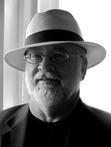Bruce DeSilva's Blog, page 33
March 10, 2014
So You Want To Be A Novelist?
The following originally appeared on the website Nakedauthors.com

Bruce DeSilva at Manhattan’s Mysterious Bookshop
You say you think maybe you could write a novel? What are you waiting for? If you have imagination and talent, it’s easier than you think.
Q: But I make pizzas all day, help Becky and Bucky with their homework on school nights, ferry the kids to ballet lessons and soccer games on the weekend, and have to clean the garage, mow the lawn, wash the car, walk the labradoodle, and fight with my ex. How can I ever find the time?
A: Write five hundred good words five days a week. That’s not much, right? It’s just a sixth-grade writing assignment. If you do that, you can finish the first draft of an 80,000-word novel in thirty-two weeks. Can’t fit that into your busy schedule? Then write five hundred words a day two days a week. You can accomplish that just by curtailing your Late Show with David Letterman habit. At that pace, you can complete a first draft in eighteen months. Oh, and screw the garage. Everybody’s looks like that.
Q: Huh. Do you practice what you preach?
A: Yeah. My garage is a toxic waste dump.
Q: I meant the writing part.
A: That, too. I wrote my Edgar Award-winning first crime novel, Rogue Island, while I was working full time as a senior editor at The Associated Press. Providence Rag, the third novel in my hardboiled series featuring investigative reporter Liam Mulligan, is being published in hardcover and e-book editions on March 11. The new book has already scored starred reviews in Publishers Weekly and Booklist. Now that I’m a full-time novelist, I write a thousand words a day. If I accomplish that after a couple of hours, I can give myself the rest of the day off or come over to walk your damned dog. But if I don’t have a thousand words after eight hours, I have to keep my butt in the chair until I do. Don’t let yourself be intimidated by the seemingly enormous task of writing a novel. Set a realistic goal for yourself, stick to it, and you can get the job done.
Q: What if I get writer’s block?
A: Choose not to.
Q: Easy for you to say.
A: Yeah, it is. Before I was a novelist, I worked as a journalist for forty years. Journalists don’t have writers block. They don’t wait for inspiration. They don’t wait for their muse to show up. They write every day, whether they feel like it or not, because it’s their job. Journalists know that writer’s block is for wimps.
Q: Calling me names now?
A: Sorry. To be fair, writer’s block is caused by fear—the fear of writing something that isn’t up to your standards. Get over it. Give yourself permission to write crap. Nobody has to see it but you, and once you get something down on the page, you can rewrite it and make it sing.
Q: How do I decide what to write about?
 A: If you’re really a writer, you see characters and stories everywhere you go. Why is that little boy crying in the train station men’s room? What’s in the briefcase the business man walking through the airport has handcuffed to his wrist? What was your brother Dennis thinking when he bought that hideous diamond pinkie ring? Who’s the guy your aged Aunt Thelma sneaks off to see on the third floor of the nursing home, is he after her money, and who’s slipping him the Viagra? Notice them, and these characters will be with you when you wash your car and walk your dog. They’ll work on your subconscious, and eventually they’ll start talking to you in waking dreams. When they do, you’re ready to write.
A: If you’re really a writer, you see characters and stories everywhere you go. Why is that little boy crying in the train station men’s room? What’s in the briefcase the business man walking through the airport has handcuffed to his wrist? What was your brother Dennis thinking when he bought that hideous diamond pinkie ring? Who’s the guy your aged Aunt Thelma sneaks off to see on the third floor of the nursing home, is he after her money, and who’s slipping him the Viagra? Notice them, and these characters will be with you when you wash your car and walk your dog. They’ll work on your subconscious, and eventually they’ll start talking to you in waking dreams. When they do, you’re ready to write.
Q: But what genre should I write in?
A: Write what you read—but don’t just read like a fan. Read books the way kids back in my day used to take car engines apart and put them back together to figure out how they worked. Read for pleasure, sure, but also read for craft. By the time I started working on my first crime novel, I’d read thousands of them.
Q: What do you tell people who aren’t big readers?
A: That they’ll never be a writers.
Q: I want to base my main character on my crazy sister Peggy, but I’m afraid that if I do, she’ll get pissy and make my life miserable.
A: If she gets mad, ask her if she thinks she’s really like that nutty character in your novel. When she says, “Of course not,” ask what makes her thinks the character is her. Besides, if you don’t write the book you want to write, you’ll be miserable anyway.
Q: Maybe I could set my novel in some weird place like Ulan Bator, Mongolia, or Burbank, California, to throw her off.
A: Only if you’ve spent a lot of time there. You need to know your setting well so you can make readers see, hear, and smell it. As my writer-friend Thomas H. Cook says, if you want to know why place is important in a novel, imagine Heart of Darkness without the river.
Q: You seem to know a lot about this stuff. When I’m done, will you read my book and tell me what you think?
A: Oh hell, no.
Q: Why not?
A: Because I’m busy with my own writing. Besides, I need to clean the garage, mow the lawn, wash the car, walk my Bernese mountain dog, and fight with my ex. Don’t ask an established writer to read your stuff unless he is a very close friend—or unless you can threaten to post naked pictures of him and Roseanne Barr on Twitter.
Q: So who should I show my work to?
A: When you’re writing, don’t show it to anybody. When you’re done, pick out one or two people who actually know something about writing to look it over. But don’t show it to too many people. Their conflicting opinions will confuse you.
Q: What about my three best drinking buds? They’re all dying to read it.
A: No they aren’t. They’re just saying that. And if they read it and think it sucks, they’ll lie to you.
Q: I’m a senior citizen. Is it too late for me to start?
A: Of course not. I wrote my first novel when I was sixty three and my second when I was sixty four. After they received rave reviews, my publisher rewarded me with a new, three-book contract. The third novel, Providence Rag, is my best to date. I’ve got another completed novel in the can, and I’ve made a small start on two more.
Q: What about my twenty-three-year-old grandkid, Billy? He’s got an MFA in creative writing, and he wants to write novels too.
A: Tell him to wait until he’s lived a little. He doesn’t have anything to write about that a sane grownup wants to read.


The Associated Press and The Providence Journal Rave About “Providence Rag.”
 The Associated Press says that with Providence Rag, the new book in my Edgar Award-winning crime series, “DeSilva . . . puts forth tough questions with no straight answers — and delivers another outstanding novel.”
The Associated Press says that with Providence Rag, the new book in my Edgar Award-winning crime series, “DeSilva . . . puts forth tough questions with no straight answers — and delivers another outstanding novel.”
And The Providence Journal newspaper calls the novel “one of the best hard-boiled thrillers of this or any year.”
You can read the full Associated Press review here. And The Providence Journal review here.
The book previously garnered starred reviews from Publishers Weekly and Booklist. You can place your orders here.


March 9, 2014
“Providence Rag,” The Interview
 Bill Van Siclen, arts writer at The Providence Journal, interviewed me about Providence Rag, the latest crime novel in my Edgar Award-winning series, last week. The result is a nice write-up that appeared in today’s (March 9) Sunday paper, both in print and online. You can find the full article here.
Bill Van Siclen, arts writer at The Providence Journal, interviewed me about Providence Rag, the latest crime novel in my Edgar Award-winning series, last week. The result is a nice write-up that appeared in today’s (March 9) Sunday paper, both in print and online. You can find the full article here.
I began my journalism career at that newspaper and worked there, mostly as an investigative reporter, for thirteen years; so it felt odd to be the one answering the questions instead of asking them. But I’ll get over it. Bill did a nice job.
Providence Rag, part of my series featuring Liam Mulligan, is being published on March 11 in hardcover, e-book, and audio editions. You can place advance orders here.


March 7, 2014
What Is Crime Novelist READING? Check it Out
The assignment from the blog editor was simple: Tell us what you are reading now and why. The following originally appeared on this fine website.
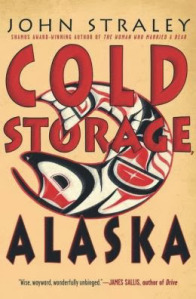 When I’m writing a novel, I rarely read anything but newspapers, and I make a special point to avoid crime novels. If I read them, my writing begins to mimic their voices instead of sounding like my own. But when I finish writing a book, I take a break from work and binge-read novels and American history. Last night I tore through Cold Storage, Alaska, the fourth novel by John Straley, who also works as a criminal investigator for that state.
When I’m writing a novel, I rarely read anything but newspapers, and I make a special point to avoid crime novels. If I read them, my writing begins to mimic their voices instead of sounding like my own. But when I finish writing a book, I take a break from work and binge-read novels and American history. Last night I tore through Cold Storage, Alaska, the fourth novel by John Straley, who also works as a criminal investigator for that state.
Straley’s publisher markets him as a crime novelist, and crimes certainly do occur in his books, but I see them as novels of place. The setting for the new one is a tiny village on the Alaskan coast, where it always seems to be raining–except when it snows. Hemmed in by mountains on one side and the sea on the other, it is an isolated place, the supply plane that flies in when weather permits it’s only lifeline to the outside world.
Straley peoples this vividly-drawn landscape with the sort of quirky characters one might meet by wandering into the wrong small-town Alaskan bar. There’s Mouse Miller, a drunk who’s in love with a long-dead barmaid. And Miles McCahon, a physician’s assistant (the town doesn’t have a physician) who talks to his outboard motor. And Miles’s brother Clive, a former drug dealer who hears animals talk to him. And Little Brother, an abused brindle fighting dog that Clive rescued. They are the sort of characters the great Howard Frank Mosher (Waiting for Teddy Williams) would create if he wrote about Alaska instead of his native Northeast Kingdom, Vermont.
The characters and setting are so compelling that the plot barely matters, but the book has a good one. To learn about that, you should read it for yourself. I think you’ll love it.


March 2, 2014
Mystery Novelist Zoë Sharp Interrogates Me About “Providence Rag”
Zoë Sharp interviewed me about Providence Rag, my new Mulligan crime novel, for the blog Murder is Everywhere. Here’s how the conversation went:
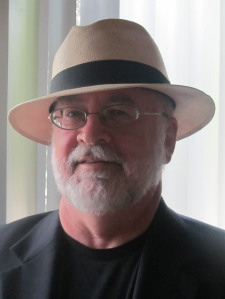 I’m delighted to have the opportunity this week to do a Q&A with the charming and talented Bruce DeSilva, author of the Liam Mulligan series set in Providence, Rhode Island, and to chat with him about the reasons behind the location for his multi-award winning novels.
I’m delighted to have the opportunity this week to do a Q&A with the charming and talented Bruce DeSilva, author of the Liam Mulligan series set in Providence, Rhode Island, and to chat with him about the reasons behind the location for his multi-award winning novels.
Zoë Sharp: PROVIDENCE RAG, the third crime novel in your series featuring investigative reporter Mulligan, is yet another beautifully observed book. And once again, the story is set in “RowDYElin.” I know you now live in New Jersey, but how much time did you spend in Rhode Island in order to write this?
Bruce DeSilva: I made several road trips to do research and to catch up with family and friends who live in the area. But I grew up in a little Massachusetts town twenty miles from the Rhode Island border, started my working life as a reporter for The Providence Journal, and lived in the state for years. I know the place well.
ZS: How important do you feel your Rhode Island setting is to the stories you write about Mulligan? Would they work just as well if he was based in Manhattan and working for The New York Times, for example?
BDS: I’m sure they wouldn’t. Mulligan doesn’t just cover Rhode Island. He grew up there. The place shaped his behavior and his beliefs. He’d be a very different guy if he were from somewhere else. Providence, the state’s capital, isn’t much like Los Angeles, Miami, or the other big cities where so many crime novels are set. It’s big enough to have the usual array of urban problems, but it’s so small that it can make you claustrophobic. Most of the people you see on the street know your name, which makes it a hard place to keep secrets. It also makes it a place where a lot of things get done through personal connections.
 Need a plumber’s license, for example? Chances are you’ve got a friend or a relative on the board. And if you don’t, you have the option of offering a small gratuity. Mulligan says that without the lubrication of personal connections and bribery, not much would get done in Rhode Island—and nothing at all would happen done on time. As he sees it, graft comes in two kinds, good and bad, just like cholesterol. The good kind pads the incomes of underpaid state employees, puts braces on their kids’ teeth. The bad kind enriches politicians and their wealthy friends and taxpayers’ expense. Rhode Island has always had plenty of both kinds. The state’s culture of organized crime and political corruption dates all the way back to a colonial governor dining with a famous pirate named Captain Kidd. Mulligan’s job as an investigative reporter is to root out the bad graft; but he sees nothing wrong with, or even inconsistent about, placing a bet with his bookie or paying a small bribe to get a safety inspection sticker for his decrepit Ford Bronco. I don’t think he’d think this way if he were from, say, Iowa or Vermont.
Need a plumber’s license, for example? Chances are you’ve got a friend or a relative on the board. And if you don’t, you have the option of offering a small gratuity. Mulligan says that without the lubrication of personal connections and bribery, not much would get done in Rhode Island—and nothing at all would happen done on time. As he sees it, graft comes in two kinds, good and bad, just like cholesterol. The good kind pads the incomes of underpaid state employees, puts braces on their kids’ teeth. The bad kind enriches politicians and their wealthy friends and taxpayers’ expense. Rhode Island has always had plenty of both kinds. The state’s culture of organized crime and political corruption dates all the way back to a colonial governor dining with a famous pirate named Captain Kidd. Mulligan’s job as an investigative reporter is to root out the bad graft; but he sees nothing wrong with, or even inconsistent about, placing a bet with his bookie or paying a small bribe to get a safety inspection sticker for his decrepit Ford Bronco. I don’t think he’d think this way if he were from, say, Iowa or Vermont.
ZS: Like your main protagonist, Mulligan, you were a journalist yourself for forty-one years, including a stint on The Providence Journal. How close is that to your fictional Providence Dispatch? And where you decided to deviate from the truth, why was that?
BDS: The fictional Dispatch is certainly based on The Journal. Both were once great small-city metros with well-earned reputations for fine writing and aggressive investigative reporting. And like most newspapers these days, both have fallen on hard times, hemorrhaging readers and advertising. But I am not privy to The Journal’s proprietary business information or to what goes on day to day in its newsroom. So all of the granular details about The Dispatch, including specifics about its financial health and the actions of the characters who populate the news staff, are made up. Of course, that hasn’t stopped a couple of my former colleagues from thinking that Mulligan is based on them. He’s not. Mulligan is me—except that he’s twenty-three years younger and a lot taller.
 ZS: Hmm, funny how our fictional creations are so rarely shorter and older than we are, isn’t it? They say the most interesting crime stories are not about cops working on cases, but about cases working on cops. In your new novel, you show the moral dilemmas facing not just Mulligan, his fellow journalists, and the cops they interact with, but the effect it has on the relatives of the guilty and the innocent, and indeed the whole town. What was your plan when you set out to write this book?
ZS: Hmm, funny how our fictional creations are so rarely shorter and older than we are, isn’t it? They say the most interesting crime stories are not about cops working on cases, but about cases working on cops. In your new novel, you show the moral dilemmas facing not just Mulligan, his fellow journalists, and the cops they interact with, but the effect it has on the relatives of the guilty and the innocent, and indeed the whole town. What was your plan when you set out to write this book?
BDS: It was. In PROVIDENCE RAG, my protagonist, his fellow reporters, his editors, and pretty much the entire state become ensnared in an ethical conundrum that has no right answer. No matter which side of the issue any of them make their stand on, they are condoning something that is reprehensible. I wrote the novel because I wanted to explore the implications of that.
ZS: I got the impression that Mulligan is more of an observer than in the previous books. Although it’s partly down to him that the teenage killer is caught in the first place, it’s Edward ‘Thanks-Dad’ Mason, son of the newspaper publisher, and photographer Gloria Costa, survivor of a vicious assault that robbed her of the sight in one eye, who seem to have been pushed into more prominent roles. How much do you view this as ‘a Liam Mulligan novel’ and how much as an ensemble piece?
BDS: To some degree, all of my novels have had ensemble casts. In the first novel, ROGUE ISLAND, Mulligan’s bookie, a female fire chief, and Thanks-Dad all play major roles. I work hard on my secondary characters, giving them distinctive voices and significant parts to play. But Mulligan is always the protagonist who drives the main action of the story. He’s like Seinfeld was to Elaine, Kramer and George—except that in ‘Seinfeld’, nobody got shot.
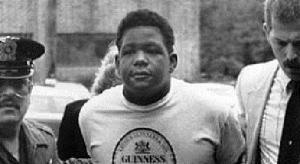 ZS: I wondered why I never watched ‘Seinfeld’! This book is inspired by a true story?
ZS: I wondered why I never watched ‘Seinfeld’! This book is inspired by a true story?
BDS: Yes, by the Craig Price case, which I covered as a journalist years ago. Price was the youngest serial killer in U.S. history, slaughtering four of his female neighbors before he was old enough to drive. When he was caught in 1989, Rhode Island’s criminal justice statues hadn’t been updated in years. They were written by legislators who never envisioned a child like him. So the law required that Price be released at age 21 and given a fresh start. Nevertheless, he has remained behind bars, convicted of a series of offenses he supposedly committed on the inside. I suspect that some of those charges were fabricated, but in the very least it’s clear that Price has been wildly over-sentenced. For example, he was given thirty years for refusing to submit to a court-ordered psychiatric examination. Price is surely too dangerous to be released, but if authorities are playing games to keep him locked up, they are abusing their power. And if they can do this to him, what’s to stop them from doing it to somebody else? In real life, Rhode Islanders aren’t asking this question. In the novel, my fictional teenage serial killer is caught and imprisoned in the first seventy-five pages. The rest of the book is devoted to a high-stakes struggle over where justice lies when the only way to keep a psychopath behind bars is to pervert the criminal justice system.
ZS: You must have come across many fascinating true stories during your time not only as a journalist, but also as world-wide writing coach for The Associated Press, where you edited many award-winning stories (including the Pulitzer). Does this mean you have a stock of good material for your future novels?
BDS: Oh, sure—but I think anyone who has lived an interesting life and remained relatively conscious has accumulated enough experiences to fill several shelves with novels. When young people who aspire to be novelists ask me how to get started, I tell them to do something else first. Tend bar, drive a taxi, enlist in the army, teach school … Until you’ve lived a little, you don’t have anything to write about that a sane grownup wants to read.
ZS: I agree totally. So, what’s next for Mulligan and crew? And will we see more of Larry Bird?
BDS: The fourth Mulligan novel, tentatively titled A SCOURGE OF VIPERS, is completed and will be published in March of 2015. The story finds Mulligan exploring the world of legal and illegal sports gambling. And I’ve made a small start on the next one. As for that potty-mouth, Larry Bird, (the reference will make sense once you read the book,) I don’t believe he will darken Mulligan’s door again.
ZS: Shame—I rather liked him. Do you see yourself stepping away from your present Rhode Island setting? And why?
BDS: I don’t see Mulligan venturing far from his home base. However, I’m collaborating on a new novel with my wife Patricia Smith, one of our greatest living poets. The book will be set in her native Chicago and will have dueling narrators, a Chicago cop who speaks in my voice and a black hairdresser who speaks in Patricia’s.
ZS: Sounds an intriguing project. What have you found hardest about swapping from non-fiction to fiction?
BDS: For me, the transition has been smooth. Fiction and non-fiction require pretty much the same skill set, including an eye for meaningful details, an ear for dialogue, and an understanding of story structure. If anything, I find fiction is easier because I can take the story anywhere I please. After decades of fretting daily about accuracy and fairness, it’s liberating to be able to make stuff up.
ZS: But there must have been some unexpected challenges.
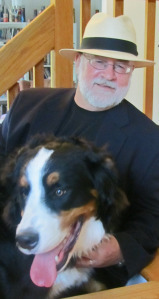 BDS: Well … I do find that I am often bullied by my own creations. The other day, for instance, Mulligan insisted that I turn the TV off in the middle of the CBS tribute to The Beatles and write the opening chapter of a new book about him. Come on, buddy, I said. “Don’t you want to hear John Legend and Alicia Keys sing ‘Let it Be’? Mulligan is not the kind to let anything be. He smirked and stared dictating the first paragraph. There’s no arguing with him when he gets like this. I set the show to record and sat down at the keyboard. This wouldn’t be so annoying if Mulligan was the only one, but he’s not. Last fall, when I was writing the fourth novel about him, a young stranger knocked on my skull. Said his name was Dante. Grew up in a mob family. Studied criminal justice at John Jay College. Figured it would come in handy no matter which side of the law he decided to live on. Sorry, I told him. There’s no role for you in this Mulligan novel. But Dante wanted a book all his own. He kept nagging. Finally I had to stop what I was doing and write an opening chapter about him. Only then could get him to leave me alone. And now he’s back. I live with my characters. When I walk my dogs or drive my car, they are with me, working on my subconscious. And sometimes they speak to me in waking dreams.
BDS: Well … I do find that I am often bullied by my own creations. The other day, for instance, Mulligan insisted that I turn the TV off in the middle of the CBS tribute to The Beatles and write the opening chapter of a new book about him. Come on, buddy, I said. “Don’t you want to hear John Legend and Alicia Keys sing ‘Let it Be’? Mulligan is not the kind to let anything be. He smirked and stared dictating the first paragraph. There’s no arguing with him when he gets like this. I set the show to record and sat down at the keyboard. This wouldn’t be so annoying if Mulligan was the only one, but he’s not. Last fall, when I was writing the fourth novel about him, a young stranger knocked on my skull. Said his name was Dante. Grew up in a mob family. Studied criminal justice at John Jay College. Figured it would come in handy no matter which side of the law he decided to live on. Sorry, I told him. There’s no role for you in this Mulligan novel. But Dante wanted a book all his own. He kept nagging. Finally I had to stop what I was doing and write an opening chapter about him. Only then could get him to leave me alone. And now he’s back. I live with my characters. When I walk my dogs or drive my car, they are with me, working on my subconscious. And sometimes they speak to me in waking dreams.
ZS: Sounds strangely familiar—and long may it continue. When our imaginary friends stop talking to us, then we know we’re really in trouble. I usually like to include a Word of the Week at the end of my blogs—an obscure or interesting word that I’ve stumbled across during one of my forays into the dictionary. Would you care to supply one?
BDS: Allow me to offer the German noun serienmorder. It means exactly what it sounds like. The word was coined by a German detective named Ernst Gennat in 1930. Robert Ressler, one of the first FBI profilers, is generally credited with coining the English equivalent, serial killer, in 1974.
ZS: Bruce, it’s been a pleasure and an honour, as always. Thank you for joining us here at Murder Is Everywhere. Over to you, folks—if you have questions for the talented Mr DeSilva, now’s your chance to ask ’em.


February 27, 2014
How A Publisher Should Never Treat A Writer, Or What The F***k Is Wrong With Coffee House Press?
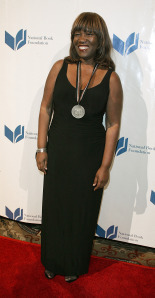
Patricia with her National Book Award finalist medal.
You are Coffee House Press, and you have the privilege of publishing Patricia Smith, one of the most honored American poets of this century.
Her first book for you was a prestigious National Poetry Series selection. The second was a finalist for the National Book Award. The third won last year’s Lenore Marshall Prize, given by the Academy of American Poets in recognition of the most outstanding book of poetry published in the United States. Her books sell better than any other poet you publish. And she is a dynamic performer of her work.
This writer you have every reason to treasure is appearing at the AWP Conference in Seattle this week. She is doing seven public readings there, and appearing on two panels. And twelve thousand people are registered. So how many of her books did you bring to sell at the event?
Her first book for you, Teahouse of the Almighty?
Zero.
Her second, Blood Dazzler?
Zero.
Her latest, Shoulda Been Jimi Savannah?
Five.
Patricia sells more books than that when she visits a high school English class. At this week’s conference, she could have sold a couple of hundred without half trying.
Meanwhile, little Tia Chucha Press brought a whole carton of Patricia’s first book, Life According to Motown, which it published TWENTY FOUR YEARS AGO.
So tell me, Coffee House. You do understand that the whole point of publishing a book is to sell it to readers, right?
Or am I’m giving you too much credit?
Five books. Not cool. But at least you did something to promote your author, right? Say, a little sign in your booth that mentions her awards?
No.
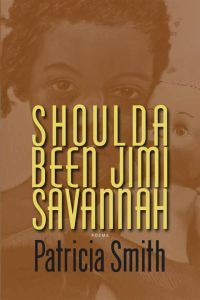 Did you maybe put a sticker on those five books to identify them as the Lenore Marshall winner?
Did you maybe put a sticker on those five books to identify them as the Lenore Marshall winner?
Not that either.
You publish some handsome volumes, Coffee House, but when it comes to marketing them, you’re incompetent.
And Patricia Smith should start looking for another publisher.
Full discosure: Patricia Smith is my wife.


February 23, 2014
Why Investigative Reporter Liam Mulligan Fears The Future
 Like most newspaper professionals these days, Liam Mulligan, a fictional investigative reporter at The Providence Dispatch, fears the future.
Like most newspaper professionals these days, Liam Mulligan, a fictional investigative reporter at The Providence Dispatch, fears the future.
The paper’s longtime-owners, a group of wealthy Rhode Island families who have controlled the Dispatch since the Civil War, always ran the place as a public service. For decades, they held out against the nationwide trend of local owners selling out to chains, and Mulligan has been grateful for that. But now, after too many years of declining circulation and advertising, the owners have reluctantly put the paper on the market. And the only suitor is a bottom-feeding media conglomerate that cares about nothing but the bottom line.
Mulligan is a wisecracking tough guy. Not much phases him. But he shudders when he thinks about what’s coming. For him, investigative reporting has always been a calling—like the priesthood but without the sex. But he’s in his forties now, and he knows his days as a newspaperman are numbered. He doubts he could ever be any good at anything else.
From where he sits, other metropolitan newspapers aren’t much of an option. Nearly all of them, hemorrhaging readers and revenue, have become mere shells of the vital institutions they once were. And few of them are hiring. They are laying people off.
Television news and online news websites don’t look like much of an option either. Network television news departments, never all that great to begin with, have shriveled into irrelevance. Twenty-four-hour cable news channels spew endless loops of trivial celebrity gossip, provide soap boxes for blowhards, and poison the public discourse with partisan distortions and misinformation. And the handful of internet news websites striving to be more than propaganda organs for the left and right lack the revenue streams required to cover the news with breadth and depth.
Mulligan, the protagonist of my Edgar Award-winning series of hardboiled crime novels, sees nothing on the horizon to replace newspapers as honest brokers of information. He’s appalled at how much damage their demise is doing to the American democracy.
If I were younger, I’d be in the same fix Mulligan is in. In recent years, I grew weary of being part of a rear-guard action and dispirited over the inevitability of the journalism’s decline. But I fought the good fight. The last major project I oversaw as a senior Associated Press editor, an investigative series about the exploitation of child gold miners in Africa, was a finalist for the Pulitzer Prize. But five years ago, when the AP offered an early retirement package—part of its own retrenchment in the face of economic pressures—I decided it was time for a second act.
I’m a full-time novelist now, and the third novel in my Mulligan crime series, Providence Rag, will be published in hardcover and e-book editions on March 11. The book has already received starred reviews in Publishers Weekly and Booklist.
In each Mulligan novel, my protagonist shows his grit by investigating crime and corruption in the state of his birth. In Rogue Island, he investigates an arson spree that is destroying the working class Providence, R.I., neighborhood where he was raised. In Cliff Walk, he investigates political corruption that has allowed the state’s rampant sex trade to thrive. And in Providence Rag, he and the entire state struggle with the ethical dilemma of what to do about a psychopath who is being held in prison on phony charges because he is too dangerous to be set loose.
I want my novels to be enjoyed as suspenseful entertainment—but they are also about something more. It is my hope that as readers follow the skill and dedication with which Mulligan pursues the truth under increasingly difficult circumstances, they will gain a greater appreciation for what all of us are losing as newspapers fade into history
You can place pre-orders for Providence Rag here.
This article first appeared in Kevin’s Corner, Kevin Tipple’s fine blog, which you can find here.


February 19, 2014
“Kirkus Reviews” Raves About “Providence Rag”
 Kirkus Reviews, one of the bibles of the publishing industry, has included my latest crime novel Providence Rag, in it’s list of “Eight Tales to Warm You Up for the New Year.”
Kirkus Reviews, one of the bibles of the publishing industry, has included my latest crime novel Providence Rag, in it’s list of “Eight Tales to Warm You Up for the New Year.”
The review says the novel “was inspired by Rhode Island’s notorious Craig Price murders of the 1980s. . . . DeSilva raises important issues and doesn’t resolve them easily. Highly rewarding.”
The novel, the third in my Edgar Award-winning series featuring investigative reporter Liam Mulligan, previously received starred reviews from Booklist and Publishers Weekly. You can find the full Kirkus article here.
Providence Rag will be published in hardcover and e-book editions by Forge on March 11, and a downloadable audio edition from Audible.com will soon follow. The novel can be pre-ordered here.


February 17, 2014
Touring Providence, The Setting For My Mulligan Crime Novels, With NPR’s Jennifer Ludden
 With my new crime novel, Providence Rag, scheduled to be released in two weeks, I am re-posting this edition of NPR’s “Crime in the City.”
With my new crime novel, Providence Rag, scheduled to be released in two weeks, I am re-posting this edition of NPR’s “Crime in the City.”
I got to take public radio correspondent Jennifer Ludden on a tour of Providence, R.I., the setting for my Edgar Award-winning crime novels, and she did a fine job of job of introducing readers to my protagonist, investigative reporter Liam Mulligan, and the city that is his beat.
You can find both audio and print versions of her story here.
Providence Rag, the third book in the series, has already received starred reviews in Booklist and Publisher’s Weekly. The novel will be published in hardcover and e-book editions by Forge on March 11. You can place advance orders here.


February 8, 2014
“Providence Rag” Book Tour Schedule
 The cross-country book tour to promote Providence Rag, the third novel in my Edgar Award-winning Mulligan crime series, starts on March 11 with a book release party at Manhattan’s famous Mysterious Bookshop.
The cross-country book tour to promote Providence Rag, the third novel in my Edgar Award-winning Mulligan crime series, starts on March 11 with a book release party at Manhattan’s famous Mysterious Bookshop.
From there, I’ll be crisscrossing the country from San Francisco to Minneapolis on a journey that finally ends three weeks later with several appearances in my native New England.
If you’re going to be near any of the stops on my tour, I hope you’ll drop by to chat and get a novel signed.
Here’s the full schedule so far. (More dates may be added later.)
March 11, NEW YORK CITY, Mysterious Bookshop, 48 Warren St., Manhattan, 6:30 p.m.
March 13, MINNEAPOLIS, MN, Once Upon a Crime bookstore, 604 West 26th St., 7 p.m.
March 15, SEATTLE, WA, Seattle Mystery Bookshop, 117 Cherry St., noon.
March 15, SEATAC, WA, Mystery Writers of America/Northwest Chapter, 13 Coins Restaurant, 18000 International Bvd., 6 p.m.
March 16, SAN FRANCISCO, CA, Borderlands Books, 866 Valencia St., 3 p.m.
March 18, ORANGE, CA, Book Carnival bookstore, 348 Tustin St, 6:30 p.m.
March 19-23, MONTEREY, CA, Left Coast Crime conference, Portola Hotel & Spa, 2 Portola Plaza.
March 27, SCOTTSDALE, AZ, The Poisoned Pen bookstore, 4014 N. Goldwater Blvd., 7 p.m.
March 28, AUSTIN, TX, Book People bookstore, 603 Lamar Blvd., 7 p.m.
March 29, HOUSTON, TX, Murder by the Book bookstore, 2342 Bissonnet St., 4:30 p.m.
March 30, DELRAY BEACH, FL, Murder on the Beach Bookstore, 273 Pineapple Grove Way, 5 p.m.
April 3, PROVIDENCE, RI, Providence Public Library, 150 Empire St., 7 p.m.
April 5, TAUNTON, MA, Readmore Books, 330 Winthrop St., noon.
April 6, MYSTIC, CT Bank Square Books, 53 W. Main St., noon.
Providence Rag, which has already received starred reviews from Publishers Weekly and Booklist, will be published in hardcover and e-book editions by Forge on March 11 and can be ordered in advance here. But I hope you’ll buy a book from one of the great independent bookstores I’ll be visiting.



